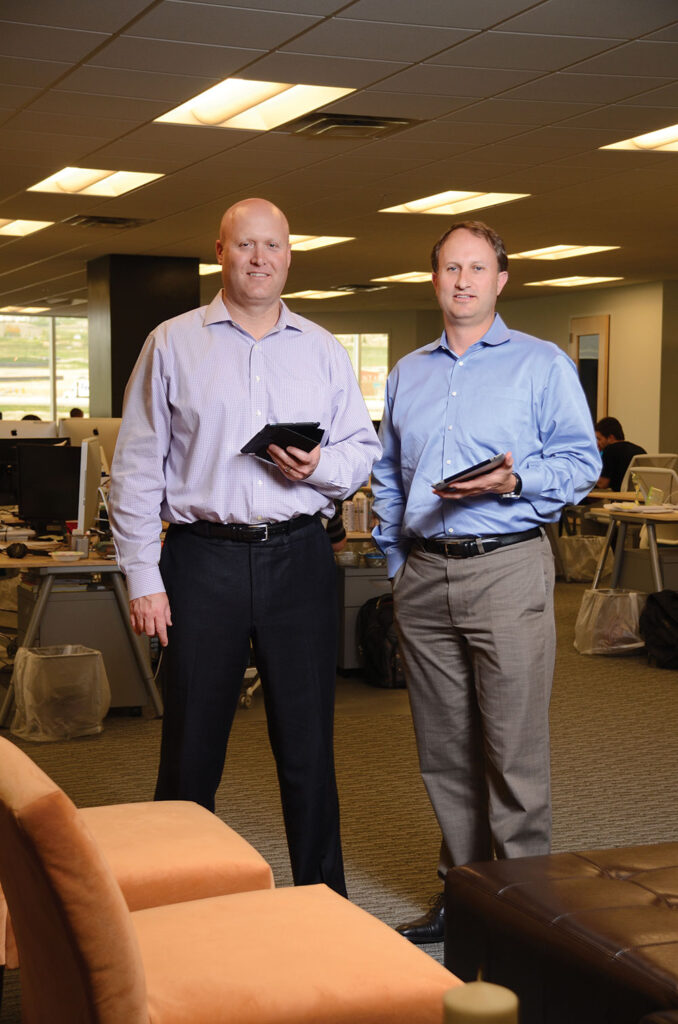
Five years ago, MokiMobility wouldn’t exist. The Lehi technology company, which secures, manages and monitors fleet-oriented mobile devices, is taking a swipe at the future — and it’s already powering up. “We instantly saw the opportunity,” co-founder Tom Karren says. “If these devices are going to be used as cash registers, medical clipboards and UPS sign forms, they’ll need to be managed.” And they’re not the only ones who think so. Companies like Marriott, FedEx and Renaissance all use MokiMobility to ensure their mobile screens don’t get out of hand. And the list of potential customers? As long as the Internet is (world) wide. “This market is new and it’s huge,” co-founder Ty Allen says. “We were looking for a scalable opportunity, and we got slapped in the face with one.” Surely there’s an app for that.
We started Moki Networks in 2009 to get expertise in the mobile space. People came up with ideas for apps, and we helped them realize those ideas. After a few years, we hit upon an idea to start managing mobile devices.
Everyone is walking around with powerful pockets — and companies want to know how they can manage all the gadgets being brought to work. That’s the first wave of the commercialization of these devices. Our goal is tackling the second wave, which deals with managing mobile devices used to innovate the customer experience.
Go into the Apple store or other trendy establishments — you see cash registers going away, store associates walking around with an iPad, and instead of a marquee with names, building directories are being housed on a tablet in the lobby. These are examples of purposed uses for mobile devices — which we then help companies secure, monitor and manage.
Think of what your own device is capable of — e-mail, apps, surfing the web. It’s great for you, but if you want to take that device and make it a cash register, every person who uses it could potentially do his or her own media. Essentially, we’re taking something super powerful and dumbing it down to run just one app — which is kind of genius. And we’re running it securely in a way that we can monitor it.
In the retail space, compliance issues and credit card security is a big deal. PCI Data Security Standards have set recommendations, and we’re the first movers to go after this purposed space and do so with those security regulations in mind.
We instantly knew it would be important to be a cloud-based solution. We don’t have servers or a data center. Customers can access it from anywhere, and they don’t have to put in any infrastructure. Even better? Customers call us and we can start managing their devices during that first phone call.
We started work on the project and realized it was 10 times bigger than we anticipated. What a wonderful problem. We knew we’d have to build more features and get more engineers in order to market to our potential customer. We knew we’d be faced with bigger, meaner competition. The worry of an entrepreneur is wondering if you’ll be able to execute on the opportunities before you.
Our first step was to get money so we could add quality people to our team. We aren’t the smartest guys in our business. We’re just the guys smart enough to hire the smart guys. We raised $2 million in seed round with Epic Ventures and other notable figures in the Bay Area.
Harsh customer feedback is painful — but critical. Anytime you do a work cycle too long without showing it to the customer, you’re making a mistake. It’s OK to be embarrassed by that first release if it means getting the feedback you need. Failure is not doing the wrong thing, it’s not realizing you’ve done the wrong thing. Take little swings. The more swings you take, the better your chance of hitting a home run.
Building an A-team is difficult. It’s competitive, and it’s not just financial challenges. It’s the hip factor. The people we want only want to work on stuff they think is cool. So we try to create an environment of innovation and collaboration. If you’re the type of developer who wants to work in a cave, we’re not for you.
We didn’t mean for this to happen, but we became the old dudes. We were in our 20s when we started our first business, and then we sold it after 12 years. But what we’re pursuing now needs to be 20-something innovation with a 20-something energy level.
In five years, our company will be unrecognizable. Just think about where we were five years ago. Tablets didn’t even exist! We are well positioned to watch the trends and innovations of mobile computing. Innovation is not going to slow down. It’s going to accelerate. And it’s thrilling to think of where we’re headed.
We’re taking something super powerful and dumbing it down … which is kind of genius.